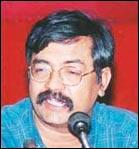
Religious, cultural significance of Dzongu will be lost if hydel projects go ahead: Basu
GANGTOK, October 14: Central Secretariat member of the CPI (M) and former MP Nilotpal Basu today said that development projects should be sustainable and address all the concerns of a society or else the projects will be “destructive”.
Development projects should not necessarily move forward with the sole motive of benefiting a handful of people, the Left Front leader said while addressing a gathering of the Lepcha community, political leaders and social organizations here at BL House.
He further said that “religious, cultural & anthropological significance of Dzongu will be destroyed if all hydel projects are not scrapped.”
Reiterating the party’s support to the protests against the proposed mega hydel power projects in a Lepcha tribal reserve, Mr Basu said the Dzongu issue was about protecting primitive tribes and their cultural and religious significance.
“There are some issues where the State government has absolute power, as far as the protection of primitive tribe, their cultural and religious significance are concerned,” he stated.
Appealing all other communities to come forward in support of the Lepchas, the leader said the CPI(M) would support the Lepcha movement terming the demand as justified, secular and relevant.
Earlier, the ACT today submitted a memorandum to Mr Basu, appealing for his party’s intervention to scrap the proposed projects in Dzongu.
He also said that the Constitution empowers the Centre to intervene for the protection of minority communities, including the Lepchas.
“Our Constitution provides for preservation of different cultural and ethnic identities,” he remarked adding “Besides Dzongu, issues from the Northeast as a whole were not considered properly by the Centre, no matter which ever party came to power.”
Lepchas from Dzongu at North Sikkim, under the banner of Affected Citizens of Teesta (ACT) have attained 116 days of relay hunger strike to protest the proposed implementation of mega power projects in Dzongu.
Six mega projects were being planned in Dzongu, which is inhabited by the last few members of the indigenous Lepcha community, who consider the area as sacred.
The protests had spread to the Lepcha community living in the neighbouring Kalimpong Darjeeling regions also.
Maintaining that the left party has the prime agenda for the upliftment of the tribal worldwide, the CPI(M) MP from Darjeeling Saman Pathak told the gathering that he had already raised the Dzongu issue twice in the Parliament and urged the local representatives of national political parties, especially Congress and Bharatiya Janata Party to exercise their power in this issue.
GANGTOK, October 14: Central Secretariat member of the CPI (M) and former MP Nilotpal Basu today said that development projects should be sustainable and address all the concerns of a society or else the projects will be “destructive”.
Development projects should not necessarily move forward with the sole motive of benefiting a handful of people, the Left Front leader said while addressing a gathering of the Lepcha community, political leaders and social organizations here at BL House.
He further said that “religious, cultural & anthropological significance of Dzongu will be destroyed if all hydel projects are not scrapped.”
Reiterating the party’s support to the protests against the proposed mega hydel power projects in a Lepcha tribal reserve, Mr Basu said the Dzongu issue was about protecting primitive tribes and their cultural and religious significance.
“There are some issues where the State government has absolute power, as far as the protection of primitive tribe, their cultural and religious significance are concerned,” he stated.
Appealing all other communities to come forward in support of the Lepchas, the leader said the CPI(M) would support the Lepcha movement terming the demand as justified, secular and relevant.
Earlier, the ACT today submitted a memorandum to Mr Basu, appealing for his party’s intervention to scrap the proposed projects in Dzongu.
He also said that the Constitution empowers the Centre to intervene for the protection of minority communities, including the Lepchas.
“Our Constitution provides for preservation of different cultural and ethnic identities,” he remarked adding “Besides Dzongu, issues from the Northeast as a whole were not considered properly by the Centre, no matter which ever party came to power.”
Lepchas from Dzongu at North Sikkim, under the banner of Affected Citizens of Teesta (ACT) have attained 116 days of relay hunger strike to protest the proposed implementation of mega power projects in Dzongu.
Six mega projects were being planned in Dzongu, which is inhabited by the last few members of the indigenous Lepcha community, who consider the area as sacred.
The protests had spread to the Lepcha community living in the neighbouring Kalimpong Darjeeling regions also.
Maintaining that the left party has the prime agenda for the upliftment of the tribal worldwide, the CPI(M) MP from Darjeeling Saman Pathak told the gathering that he had already raised the Dzongu issue twice in the Parliament and urged the local representatives of national political parties, especially Congress and Bharatiya Janata Party to exercise their power in this issue.
